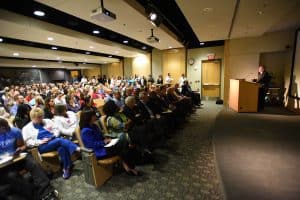Former Medicaid Advisor Discusses Impact of Health Care Reform
Dennis Smith, former director of the federal Medicaid and Medicare program under President George W. Bush, spoke March 10 about the future of the Affordable Care Act (ACA) to a room full of UAMS faculty and staff.
Smith talked about the impact of health care reform on the nation, discussing what is known and unknown about the future of the ACA in light of efforts by Congress to repeal and replace parts of it with the proposed American Health Care Act (AHCA).
A big difference is how the subsidies are structured. Under the ACA, subsidies were provided for those with incomes up to 400 percent of the federal poverty level, with the amount tied to a person’s income and the cost of insurance in the person’s area. The new proposal would provide subsidies to people with incomes up to 800 percent of the federal poverty level, but the subsidy amount would be tied to the person’s age, not income, so low-income people would get less help.
“Financing will also change, the federal government will have an upper limit cap on the amount per person that it will match,” said Smith, who last year joined the Arkansas Department of Human Services as senior advisor for Medicaid and health care reform and is a visiting professor in the UAMS College of Public Health.
From 2001 to 2008, he was director of Medicaid and State Operations for the Centers for Medicare and Medicaid Services (CMS), a part of the U.S. Department of Health and Human Services.

A packed auditorium at UAMS welcomed Dennis Smith, senior advisor for Medicaid at the state Department of Human Services and a visiting professor at the UAMS College of Public Health.
He told the packed UAMS auditorium that there are many unknowns with the proposed replacement — such as changes that may be made by the U.S. Congress, the effect on the deficit, how many people will be covered, the associated costs and whether it will save money or end up costing more.
Another unknown is what regulatory adjustments may be made, such as states asking for waivers.
Other factors that may affect the situation are the fact that the national debt is growing, unreasonable expectations that a bill that complicated could be approved this spring and unintended consequences that the working poor may not be able to earn enough to buy insurance.
“Essentially, the ones who need coverage the most won’t be able to get it. People will ultimately just stay on Medicaid and not work to their full potential,” Smith said.
More unknowns that Smith discussed include the Congressional Budget Office report on how much the replacement law would cost, how the U.S. Senate will vote and what the 2018 elections will hold.
“Uncertainty will continue in this process,” Smith said.
